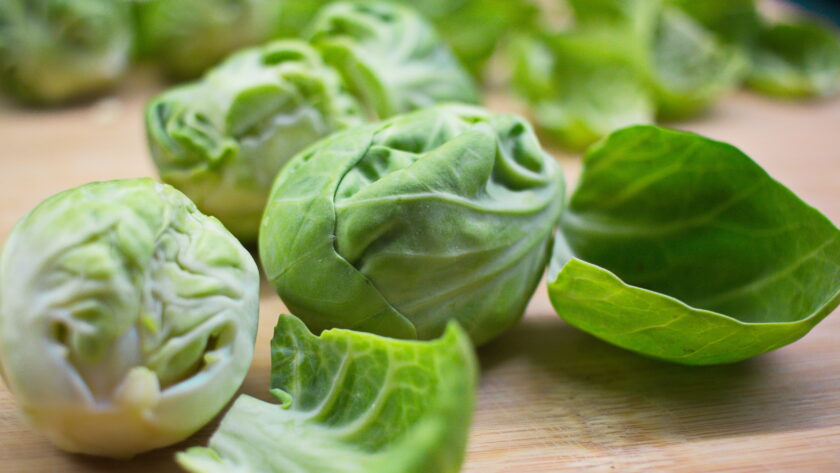Have you ever wondered if it’s safe to eat raw brussel sprouts? Many people are curious about this, as brussel sprouts have gained popularity in recent years due to their numerous health benefits. As a team of health enthusiasts and foodies, we decided to explore the topic and share our findings.
Firstly, it’s important to note that brussel sprouts are incredibly nutritious. They are loaded with vitamins C and K, fiber, and antioxidants which can help protect against cancer and inflammation.
However, some people choose to eat them raw for their crunchy texture or because they believe it preserves more of the nutrients. In this article, we’ll take a closer look at whether eating raw brussel sprouts is actually safe and what potential risks there may be.
So Is It Safe To Eat Raw Brussel Sprouts? let’s dive in!
Table of Contents
Key Takeaways
- Raw brussel sprouts contain raffinose, which is difficult for our bodies to digest and can lead to bloating and gas.
- Raw vegetables, including brussel sprouts, may contain harmful bacteria like E.coli or Salmonella, posing a risk for foodborne illness if not properly prepared.
- Cooking methods like roasting and steaming can preserve the nutrients in brussel sprouts while eliminating the risk of harmful bacteria that could cause food poisoning.
- Paying attention to your body can help determine whether raw brussel sprouts are right for you, and negative effects can be mitigated by cooking them or finding alternative vegetables.
Nutritional Value of Brussel Sprouts

You’ll be happy to know that munching on those raw brussel sprouts not only gives you a satisfying crunch, but also packs a punch of nutrition with high levels of vitamin C, fiber, and antioxidants.
In fact, cooking methods can actually reduce the nutritional value of these cruciferous vegetables. When brussel sprouts are cooked for too long or at too high of a temperature, they can lose some of their nutritional properties.
For individuals with dietary restrictions or preferences, raw brussel sprouts offer an excellent option. They’re naturally gluten-free and low in calories, making them a great addition to any diet plan. Plus, their high fiber content can aid in digestion and help keep you feeling full longer.
So next time you’re looking for a healthy snack or side dish option, consider grabbing some fresh raw brussel sprouts instead of reaching for the chips or fries!
Potential Risks of Eating Raw Brussel Sprouts
Before indulging in your favorite vegetable, it’s important to understand the potential dangers of consuming them uncooked. While raw Brussels sprouts may be appealing to some, they can pose a risk for foodborne illness if not properly prepared.
This is because raw vegetables are more likely to contain harmful bacteria such as E.coli or Salmonella. Consuming raw Brussels sprouts can also cause digestive issues. Raw cruciferous vegetables like Brussels sprouts contain a type of sugar called raffinose which is difficult for our bodies to digest.
This can lead to bloating and gas. Cooking these vegetables breaks down the raffinose making them easier on our digestive system. So while it may be tempting to snack on some raw Brussels sprouts, it’s best to cook them thoroughly before consumption for both safety and digestive reasons.
Benefits of Cooking Brussel Sprouts
Once you’ve cooked those little green gems, they’ll transform into a tender and flavorful addition to any meal, like a rainbow in your dish. Cooking brussel sprouts not only eliminates the risk of harmful bacteria that could cause food poisoning, but it also enhances their flavor and texture.
Roasting and steaming are two popular methods for cooking brussel sprouts – both have their unique benefits. Roasting brussel sprouts brings out their natural sweetness while adding a slightly nutty flavor. To roast them, simply toss with olive oil, salt, and pepper before placing them on a baking sheet in the oven at 400°F for 25-30 minutes.
Steaming is another healthy option that preserves most of the nutrients while softening the texture. Pairing steamed brussel sprouts with lemon juice or balsamic vinegar adds brightness to the dish without overpowering its subtle flavors. Cooking brussel sprouts can be an easy way to elevate any meal while ensuring that it’s safe to eat!
Flavor pairings are endless when it comes to cooking these versatile vegetables – from bacon and onion to parmesan cheese and garlic! Brussel sprouts also complement a wide variety of proteins such as chicken, fish, or tofu. Experimenting with different seasonings like rosemary or thyme can add depth to your dish without overcomplicating things.
The possibilities are endless when it comes to cooking brussel sprouts – so don’t be afraid to get creative in the kitchen!
How to Properly Prepare Brussel Sprouts
To get the most out of these nutritious vegetables, start by trimming and halving them lengthwise. This will ensure that they cook evenly and have a nice texture when finished.
When it comes to cooking methods, there are two main options: roasting and steaming. Roasting brussel sprouts is a popular method that brings out their natural sweetness. Simply toss them in olive oil, salt, and pepper before placing them in a preheated oven at 400°F for 20-25 minutes or until golden brown.
Alternatively, if you prefer a lighter option, try steaming them instead. This method helps retain their nutrients while still providing a tender bite. To steam brussel sprouts, add about an inch of water to a pot with a steamer basket and bring it to a boil. Add the sprouts to the basket and cover with a lid before cooking for 8-10 minutes or until they are tender but not mushy.
Don’t be afraid to experiment with different seasoning options like garlic powder or balsamic vinegar for added flavor!
Alternatives to Eating Raw Brussel Sprouts
Looking for different ways to enjoy these nutritious vegetables? There are plenty of alternatives to raw brussel sprouts!
One popular cooking method is roasting. Roasting brussel sprouts brings out their natural sweetness and creates a crispy texture that pairs well with savory seasonings like garlic, rosemary, and parmesan cheese. To roast brussel sprouts, simply toss them in olive oil and your preferred seasoning blend, then spread them evenly on a baking sheet and bake at 400°F for about 25-30 minutes, or until they are tender and golden brown.
Another delicious way to cook brussel sprouts is by steaming them. Steaming is a healthy cooking method that preserves the nutrients in the vegetables while also keeping them tender and flavorful. To steam brussel sprouts, fill a pot with about an inch of water and bring it to a boil over high heat. Then add your trimmed brussel sprouts to a steamer basket or colander placed over the boiling water, cover with a lid, and let them steam for 5-7 minutes until they are bright green and fork-tender.
Serve your steamed brussel sprouts with some lemon juice or butter for added flavor. Whether you prefer roasting or steaming, there are plenty of tasty ways to enjoy this versatile vegetable!
Is It Safe To Eat Raw Brussel Sprouts? Listening to Your Body
Hey, you! It’s important to tune in to your body and listen for any signals that may indicate whether these little green guys are right for you. Mindful eating is all about paying attention to what your body needs and wants. And when it comes to raw brussel sprouts, it’s no different.
Some people might find that their bodies just don’t handle raw brussel sprouts well – maybe they cause bloating or digestive discomfort. Others might have no issues at all. The key is to practice intuitive eating by paying attention to how your body responds after consuming them.
If you notice any negative effects, consider cooking them instead or finding alternative vegetables that can provide similar nutritional benefits without causing discomfort. By listening to your body and making adjustments accordingly, you can ensure that your diet supports optimal health and wellness.
Frequently Asked Questions
How do I know if the brussel sprouts I want to eat raw are safe to consume?
When selecting Brussel sprouts for raw consumption, we consider their variety and flavor profiles. Look for smaller, tender sprouts with a mild sweetness. Always wash them thoroughly to remove any potential bacteria before enjoying!
Can eating too many raw brussel sprouts cause digestive issues?
Eating too many raw brussel sprouts can cause bloating, but it’s preventable by cooking or consuming in moderation. To avoid digestive issues, try pairing them with probiotic-rich foods like yogurt or kefir.
Are there any specific health conditions that would make eating raw brussel sprouts unsafe?
Pre existing conditions or allergies may make it unsafe to eat raw brussel sprouts. However, they are packed with nutritional benefits such as antioxidants, which can protect against cancer and heart disease.
Can I still get the same nutritional benefits from cooked brussel sprouts as I would from raw?
Cooked brussel sprouts offer the same nutritional benefits as raw ones. While cooking methods can affect nutrient retention, steaming or roasting preserves important vitamins and minerals. Plus, they’re delicious!
Are there any recipes or cooking methods that can help retain the nutritional value of brussel sprouts while still cooking them?
When it comes to cooking brussel sprouts, roasting and steaming are great options for retaining nutrients. For raw lovers, try mixing up your salad game with creative recipes that incorporate other nutritious ingredients.
Conclusion
So, is it safe to eat raw brussel sprouts? Well, while they certainly offer a variety of nutritional benefits, there are potential risks associated with consuming them in their raw state. The presence of harmful bacteria and enzymes can lead to digestive issues and even food poisoning.
However, this doesn’t mean you should avoid brussel sprouts altogether. Cooking them properly can eliminate these risks while still retaining their valuable nutrients. Roasting or sautéing the sprouts is a great way to bring out their natural flavor while ensuring they are safe to consume.
Interestingly, did you know that just one cup of cooked brussel sprouts contains over 160% of your daily recommended intake of Vitamin C? That’s an impressive statistic that highlights just how nutrient-dense this vegetable truly is.
So go ahead and enjoy some deliciously prepared brussel sprouts – just be sure to cook them first!




